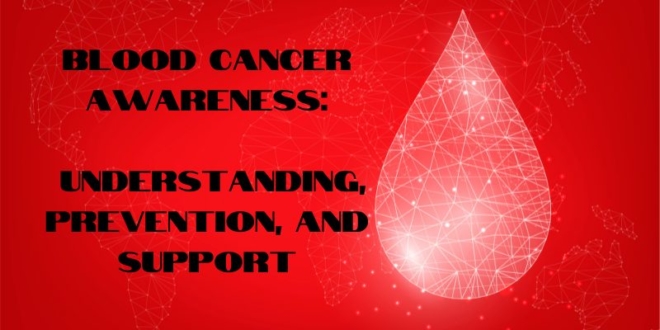September is a crucial month designated for Blood Cancer Awareness, dedicated to supporting individuals affected by this life-altering disease and raising awareness about its causes, consequences, and treatment options. Blood cancer, also known as hematologic cancer, disrupts the delicate balance of our blood, leading to uncontrolled growth of abnormal blood cells. In this blog article, we will delve into the types of blood cancer, its risk factors, common symptoms, diagnostic methods, and effective dietary guidelines for managing the disease. Additionally, we will explore lifestyle modifications that can improve the quality of life for those facing blood cancer.
Types of Blood Cancer:
Blood cancer encompasses several distinct types, each with its unique characteristics. These include leukemia, lymphoma, myelodysplastic syndromes (MDS), myeloproliferative disorder (MPD), and multiple myeloma. Understanding these variations is vital for early detection and targeted treatment.
Understanding the Causes:
Blood cancer primarily arises from mutations in the DNA of blood cells. Several risk factors increase the likelihood of developing this condition, including age, gender, exposure to harmful chemicals like benzene and radiation, smoking, genetic predisposition, and family history. It is crucial to be aware of these risk factors to take proactive steps toward prevention.
Recognizing the Symptoms:
Being vigilant about potential symptoms is key to early diagnosis and treatment. Common indicators of blood cancer include unintended weight loss, fever, anemia, breathlessness, flu-like symptoms, bruising, bleeding, rashes, bone and joint pain, swollen lymph nodes, and frequent infections. If these symptoms persist for more than a few weeks, seeking prompt medical attention is crucial.
Diagnosis and Treatment:
Blood cancer diagnosis involves a series of medical assessments, including physical examinations and a battery of tests such as blood tests, CT scans, X-rays, MRIs, and PET scans. Treatment options typically include chemotherapy and radiation therapy, which can have side effects like nausea, vomiting, loss of appetite, fatigue, and digestive issues. Managing these side effects is crucial for patients undergoing treatment.
Dietary Guidelines:
A balanced diet is essential for individuals battling blood cancer, as it can help boost immunity, reduce complications, and support tissue repair and tolerance to treatment. Here are some dietary guidelines to consider:
- Incorporate a Balanced Diet: Include foods from all food groups, such as protein, cereals, fruits, vegetables, and dairy.
- Prioritize Protein: Protein aids in boosting immunity and cell growth and repair. Opt for plant-based protein sources like beans and lentils, as well as animal-based sources like eggs, chicken, and fish. Limit red meat consumption.
- Choose Whole Grains: Opt for whole grains over refined ones to ensure a steady source of energy.
- Include Omega-3 Fatty Acids: Foods rich in omega-3 fatty acids, such as mackerel, salmon, walnuts, and canola oil, help reduce inflammation in the body.
- Diversify with Fruits and Vegetables: Variety is key; different fruits and vegetables provide antioxidants and vitamin C, which boost immunity.
- Eat Small, Frequent Meals: Aim for 5 to 6 smaller meals throughout the day.
- Consider Liquid Nutrition: If solid foods are challenging, incorporate shakes and smoothies to meet daily calorie needs.
- Experiment with Flavors: Patients undergoing chemotherapy often prefer savory, sour, slightly sweet, and salty flavors over bitter ones.
- Stay Hydrated: Consume soups, flavored water, and fresh fruit juices to maintain hydration.
- Combat Nausea: Ginger tea, mint tea, and lemon water can be soothing for nausea.
Neutropenic Diet:
For individuals experiencing neutropenia, a common side effect of chemotherapy, it is advisable to follow a specific diet. This involves avoiding raw or undercooked meat, seafood, shellfish, eggs, sprouts, unpasteurized fruit juices, milk, yogurt, cheese, unwashed fruits, vegetables, raw nuts, and well water.
Lifestyle Modifications:
Beyond dietary considerations, lifestyle modifications can significantly impact the well-being of blood cancer patients:
- Prioritize Food Safety: During and after treatment, the body is more susceptible to infection, so strict food safety measures are essential.
- Maintain a Healthy Weight: This helps reduce excess fat, maintain energy levels, and prevent treatment delays.
- Engage in Physical Activity: Regular exercise can improve muscle mass and overall well-being.
- Avoid Harmful Habits: Steer clear of smoking, alcohol, and tobacco.
- Get Adequate Sleep: Quality sleep supports the body’s healing processes.
- Manage Stress: Stress reduction techniques such as meditation and mindfulness can be immensely helpful.
Blood cancer is a challenging condition that requires comprehensive awareness, understanding, and support. By recognizing the risk factors, symptoms, and treatment options, individuals can take proactive steps towards managing the disease. Additionally, adopting a balanced diet and making essential lifestyle modifications can contribute to a higher quality of life for those affected by blood cancer. Together, we can spread awareness, offer support, and work towards a future where blood cancer is better understood and more effectively managed.









